Ava Nainifard
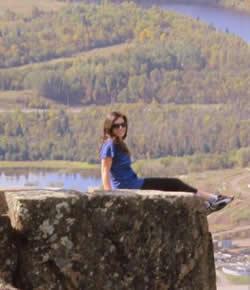
If there's one thing Ava Nainifard has learned from her master's program, it's that you can't rush decision-making when it comes to health.
"Health is such a personal thing - there are so many different viewpoints to take into account - what does it mean when someone's healthy? Different people would give you different answers." Nainifard explains that while time - consuming, it's important to take as many different perspectives into account as possible so that decisions are properly reflective of the population they will impact.
Her program's extensive overview of like challenges and dilemmas sparked a fire in Nainifard, who is now bent on making change from within the public sector. She is particularly inclined towards redirecting the attentions of politicians and policy makers to focus on more micro-level efforts and explains that the current emphasis on macro-level initiatives is only effective to an extent. Rather, individuals and communities need to be more informed and aware of how they will affected when a policy comes into play. To prepare her for these future aspirations, Nainifard hopes to spend her upcoming 4-month practicum, a requirement of her program, working for a government sector.
Another source of inspiration which guided her towards a career in public health was her participation in a pretty exciting research project. Working with a reserve in which the Right to Play program had recently been introduced, Nainifard and her team collaborated with the community's youth and conducted a needs assessment to evaluate the benefits of the program. The results were so positive, the Ministry of Northern Affair may soon implement Right to Play in several more reserves.
More than content with her focus of study and program, Nainifard has enjoyed an introduction to the many different facets of the health field from epidemiology to technologies used in statistical analysis. As well, originally from a much larger university, she's been thrilled with the dedication of her professors and feels comfortable speaking with them about her future as she lays the foundation for a career in public policy.
"They really do recognize you not as a number but as an individual."
William Halliday
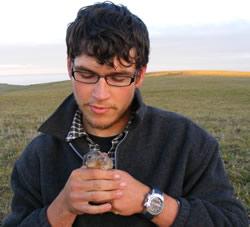
When William Halliday isn't taking notes in class or working in the lab, you will most likely find him in a nearby field catching voles.
"I'm currently looking at how competition between two species of rodents affects when they forage, where they forage, pretty much their behavior around feeding." Halliday spends most of his lengthy field days laying out traps and luring in the voles with peanut butter.
Having always enjoyed working with animals, Halliday's primary reason for coming to Lakehead was the flourishing wildlife in the Thunder Bay area.
Halliday is particularly grateful for the funding he's received, having even been gifted a few unexpected scholarships when his department had some extra money. He was also able to financially benefit from his graduate assistantship, which he spent helping one of his professors in the lab and further developing his skills.
Halliday's also been well-rewarded with experience. He's spent the last four summers in the Arctic, trapping and studying lemmings. He's also had the opportunity to TA a first-year graduate course, as well as several advanced undergraduate classes.
Besides his research and teaching obligations, Halliday is kept busy working on his thesis and attending regular lab meetings with his peers. However, when the opportunity presents itself, he enjoys a medley of hunting, fishing, snowshoeing, and skiing, taking full advantage of Thunder Bay's rich outdoor sports scene.
Hooked on wildlife studies, Halliday has high hopes for next year, aspiring to further his studies in theoretical ecology and to continue working with animals in a PhD program at the University of Ottawa or British Columbia. He may move onto study bigger animals but, as Halliday has learned, "It doesn't matter which organism you work with as much as the questions you ask."
Dr. Lisa Korteweg
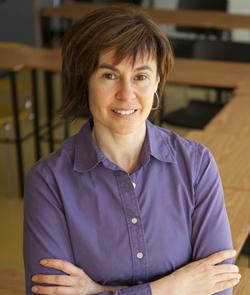
Dr. Lisa Korteweg believes that a solid understanding of K-12 classroom practices and pedagogies goes hand-in-hand with education research.
While she emphasizes that Lakehead's master's in education is distinct from a B.Ed, when teaching becomes the object of inquiry, she believes the insight and unique skill-set gained through a graduate degree can complement everyone's teaching and classroom performances.
"Teaching is truly researching; trying to understand students and each child's learning process, what's going on in the context of classroom and how the school itself is impacting students... every educator can benefit from the more research-oriented focus of a master's degree."
Dr. Korteweg's students have ample opportunity to explore their ideas about education both in and beyond the classroom. Her PhD students are researching end-of-life care education, the relationships between outdoor educators and Aboriginal peoples, and the incorporation of storytelling in the curriculum. Meanwhile, her master's students have examined topics as diverse as science education in Nunavut, the use of technologies like digital storytelling or Video-Voice by marginalized students, and analyzing masculinity in the classroom.
Students in the Faculty of Education are also able to expand their research horizons through a conference travel bursary program. Education faculty and students regularly attend major international education research conferences such as the American Education Research Association (AERA) annual meetings as well as the Canadian Society for Studies in Education (CSSE), part of the SSHRC Congress.
As well, Dr. Korteweg's students have embarked on some very impressive nationally-noted research. Her last major project on urban Aboriginal education involved a team of no less than 9 graduate students who presented their findings at provincial and federal conferences as well as a final 200 page report for the Ontario Ministry of Education and the Canadian Ministers of Education Council.
Where can graduates take their M.Ed? According to Dr. Korteweg, the sky's the limit. She explains that graduates can effectively apply their learnings in the K-12 classroom as well as in non-traditional settings such as colleges, community organizations, hospitals, and libraries. "Students can apply what they learn almost anywhere and it makes sense because almost everything that's done is related to education."
Kelsey Johansen

To say Kelsey Johansen is well-travelled would be a vast understatement. Her numerous excursions include multiple destinations within Europe and the South Pacific, where she researched protected area management and historical, military and dark tourism. She's also visited Micronesia and Palau where she spent most of her time scuba diving. While many might equate this trip with the ultimate vacation, Johansen was in fact conducting significant research which has the potential to benefit coral reefs and other underwater environments.
An experienced scuba diver, Johansen's research was motivated by a passion for the sport as well as a concern for the critical impact divers can pose to marine environments. "If you're diving and accidentally break a 10 inch piece of coral, you've destroyed a decade of growth in an instant. I wanted to develop an educational paradigm that would better inform divers of these issues and encourage them to behave more sustainably."
Consequently, Johansen set out to interview diver tourism operators and observe underwater diver behaviour. She then developed a model of diver education that advocates for a curriculum which will heighten environmental consciousness and emphasize the responsibility of divers to take ownership of their actions.
Aside from these major projects, Johansen has taken part in several recreation- and tourism based initiatives; she's investigated the potential benefits of marina development for the town of Red Rock, and served as a research assistant on a SSHRC-funded research project studying insect conservation and management.
Currently, she sits as the Publicity Director and Social Media Coordinator on the Voyageur Trail Association's Coordinating Council, volunteers on the Kinghorn Rail-to-Trail project, teaches at Lakehead as a sessional lecturer, and is preparing to give a presentation in Sweden at the 6th International Conference on Monitoring and Management of Visitors in Recreational and Protected Areas.
Having completed her jam-packed graduate experience last May, Johansen looks forward to applying to several PhD programs and taking the next step in what is proving to be an exciting and important field.
"Recreation is a huge part of our lives and is fundamental to the enjoyment of our daily life," she explains. "Through recreation and tourism, we connect with and develop peer groups; we learn new ways to understand our community, our culture, and our place in the world."
Vanessa Lucky
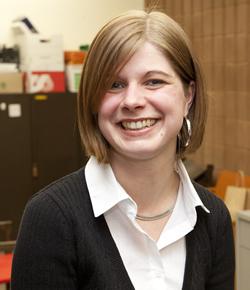
Vanessa Lucky did not choose an easy topic for her thesis. The sociology student studies safety in the sex trade and is currently analyzing how Canada's prostitution laws may be enabling the violence and abuse of sex workers.
Her research is primarily motivated by a growing knowledge of the substantial dangers in the trade, which began when she started to follow the Robert Pickton case. "The more I learned about how dangerous it is at present, the more I wanted to try to make things safer for sex workers."
Lucky has had several opportunities to share her findings. She's been interviewed by CBC, competed in Lakehead's 2012 Graduate Conference, and recently returned from giving a presentation in Brandfort, Ontario. She also just had a book review published by the Canadian Review of Sociology on Gangs and Girls: Understanding Juvenile Prostitution.
Lucky adds that she's largely been able to bring her academics into her activism and vice versa. Outside the classroom, she assists with the Walk4Justice and the Full Moon Memory Walk and sits on several boards including Diversity Thunder Bay and the Northwestern Ontario Women's Center. Recently, she accepted a position as the Aboriginal Victim and Family Liaison for the Ontario Native Women's Association and is looking forward to this exciting opportunity.
Completing her MA with a specialization in women's studies, Lucky is grateful to have had the support of both departments, which she affirms is "a recipe for success". She declares that the research training she's received is top-notch and adds that her departments regularly bring in international researchers as guest speakers to enrich the graduate experience.
However, Lucky feels the professors truly make the program.
"Over the course of my graduate education I have enjoyed the endless support and encouragement of virtually all of my professors in both my academic and extracurricular pursuits. I can honestly say that I would not have made it this far or done this well without the amazing professors at Lakehead."
Dr. Alla Reznik
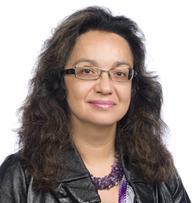
Canada Research Chair and dedicated physics professor Dr. Alla Reznik uses very complicated science to benefit some of society's most vulnerable members. A star in the fast-paced field of medical imaging, Dr. Reznik develops diagnostic tools that can assist the early detection and treatment of cancer while passing on her knowledge to graduate students.
Her students benefit from valuable hands-on experience and a very unique skill set, which has made them high in demand. One student was recently asked to present at the 24th International Conference on Amorphous and Nanocrystalline Semiconductors in Nara, Japan - the most prestigious conference in the field. Another student, working on real-time medical X-ray imaging, placed first last year in the 15th Canadian Semiconductor Science and Technology Conference in Vancouver, BC. Dr. Reznik also has her students present at meetings with her industrial partners and the annual Summer School on Medical Imaging Technologies to develop their communication and teaching skills.
Dr. Reznik stresses that Canada needs "science smarts" to drive its economy. As such, she endeavours to engage talented students by creating an inspiring learning environment within which students feel they are an integral part of the Canadian and international scientific community. She also strives to demonstrate how much her students can contribute to health care through physics - a motivating factor for those who are driven to use their science to benefit humanity.
"It is my hope that my students have an interesting scientific life during their studies and a successful career in a future!"
Rhiannon Kamstra
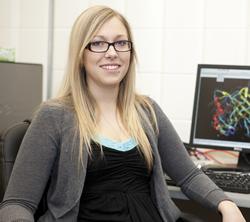
Rhiannon Kamstra believes technology will play an integral role in medicine's future developments - which is why she's opted to focus her graduate research on exploring bioactive molecules and protein targets through a combination of experimental and computational approaches.
"I decided to enter this area of research because of its potential practical relevance for various medical applications," says the chemistry graduate student. In particular, Kamstra is interested in the use of computational techniques to assist in drug discovery and development - an exciting field that's rapidly expanding.
Through the use of screening methods, she's able to identify and study molecules which have the capacity to interact with tumour enzymes. She is currently in the process of experimentally testing these compounds.
Kamstra is passionate about her project and is impressed with her program's highly collaborative environment. "It's a great choice for students who enjoy working where students, their supervisors, and supportive members of the department work in close communication."
Kamsta herself has been able to dabble in a number of projects outside her own and has even had the chance to work alongside research teams from other universities. In addition, she's had many an opportunity to network at all of the conferences she's attended - and is looking forward to several more. She's currently preparing for May's Canadian Chemistry Conference in Calgary.
Kamstra also appreciates the small size of her department, in which she has flourished. She explains that it provides an optimal environment for any student who is motivated to take direct ownership of their research.
What does she see in the future of chemistry at Lakehead? Impressed with the strong partnerships the campus maintains with the Thunder Bay Research Institute and Health Sciences Centre, Kamstra believes these connections will continue to facilitate interdisciplinary research at the university-an area in which the sciences at Lakehead truly excels.
Marissa Carrasco
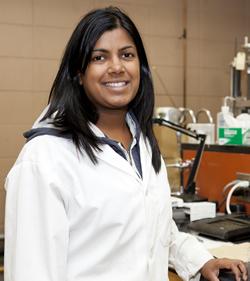
Engineering student Marissa Carrasco reasons that it just makes sense to harness the energy we generate. "With urban populations growing as fast as they are, it's especially wasteful not to use the by-products of our consumption."
Carrasco's research is reflective of this logic: she's currently examining the plausibility of freezing as a method for pre-treating sludge. While freezing is conventionally used in Northern Europe for conditioning, she explains that subjecting sludge to freeze-thawed treatment prior to digestion increases anaerobic efficiency thereby producing more biogases to power the plant.
A former teacher in Vancouver with a background in physics, Carrasco has enjoyed the opportunity to immerse herself in a field which she believes is more akin to her personality. While she has a respect for the knowledge that comes from the pure sciences, she appreciates the goal-oriented focus of engineering and being able to "get to the nitty gritty" of environmental problems.
So far, she's been very pleased with her program and the support she's received from her professors. Carrasco especially finds the open door policy to be enormously beneficial. "When you're working on something so specific, you're often in need of a professor's expertise and guidance."
She was also pleasantly surprised by Thunder Bay, which she feels to be a vastly under-rated city. Being able to drive ten minutes to a camping or fishing site is a new and revitalizing experience and the city provides plenty of outdoor sports and activities. When she's afforded the time, Carrasco enjoys fishing, skiing, and hockey, and also tutors at Kumont Learning Centre to keep up with her teaching.
After graduating, Carrasco aspires to apply her skills at a pulp and paper plant, mining company, or consulting firm. She reflects that, as well as being informative and inspiring, her education has opened her eyes to the enormous potential for engineering to solve environmental problems. "I believe it's the future, the key to sustainability. We have to make sure that as we continue to develop, we are environmentally conscious."
Sirui Zhu
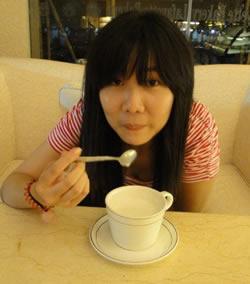
Sirui Zhu is using her knowledge of economics to examine minimum wage in Canada - and whether its value is truly going up.
Intrigued by claims that the national minimum wage had seen large increases overtime when compared to the costs of standard living, Zhu wanted to delve behind the scenes and find out whether or not this was true. Not only is her thesis proving these claims wrong, but she's discovering that in many locations, the weight of minimum wage has actually dipped. Interestingly, her findings vary considerably depending on province, as well as gender, age group, and industry.
Zhu opted to complete her graduate studies in economics after finishing an undergrad in accounting. While her first degree offered a solid understanding of math and calculations, it is her current program which has allowed her to apply this knowledge to analyze real-world problems. She is passionate about the field and recently had a paper accepted by the Conference on Interdisciplinary Business and Economics Research in Bangkok, Thailand.
Zhu is pleased with her program and her highly dedicated professors: "I think the atmosphere and the professionalism are amazing - the professors always create a very empowering atmosphere."
She also appreciates that while providing intensive and demanding courses, her department also offers a strong sense of community 'like a family'. Maintaining strong work relationships at school, faculty and students also spend time together outside of class and frequent the Outpost on Friday afternoons to relax at the end of the week and have an informal discussion about current research.
After completing her master's, Zhu is looking forward to entering the workforce and is hoping especially for a position with Statistics Canada. Inspired and empowered by her graduate experience, she is excited to assume a career in her field of choice.
Dr. Douglas Hayes

To those who ask, Dr. Hayes describes his research as "the language of the stuff that comes before Shakespeare". Fascinated by the rhetoric of medieval and Tudor drama, he's particularly interested in that of the Vice figure, ie. the bad guy of early English and Scottish theatre.
Aside from trips to the British Library and the National Library of Scotland to produce editions of early drama and poetry, Dr. Hayes has undertaken some very exciting projects. He's currently partnering with software engineer Dr. Richard Khoury to develop and rhetorically analyze an electronic linguistic corpus based on the York Cycle, a collection of biblical plays celebrating the Feast of Corpus Christi.
As a board member for the Poculi Ludique Societas, the Medieval and Renaissance Players of the University of Toronto, he oversaw the successful staging of this phenomenon over 12 hours by 350 international actors. "This proved that the whole cycle could be performed on wagons in one day and provided entertainment for a large audience who sat and watched 15th-century Biblical drama from dawn to dusk!"
Dr. Hayes balances his extensive pre-Shakespeare studies with his commitments to his students. As the department's graduate coordinator, he stresses that English at Lakehead offers a world of opportunities.
"Graduate students in English are working with our SSHRC-funded researchers, giving papers at international academic conferences, and going on to careers and PhD programs around the world." He adds that the department is at the cutting edge of new directions for English studies, yet small enough to offer a supportive environment and excellent mentoring.
"Students considering English studies at Lakehead will find both the support of a congenial group of grad students and a faculty that strives to balance course offerings and research in all the traditional areas with those in First Nations literatures, gender, cultural, and postcolonial studies, film, creative writing, and rhetoric in new media."

